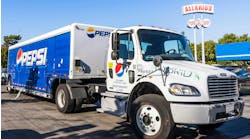The International Fuel Tax Agreement, or IFTA, was actually established to make paying state and provincial fuel taxes easier for fleets to deal with by consolidating the fuel tax returns for fleets operating in the continental United States and the Canadian provinces.
Before the inception of the International Fuel Tax Agreement, a fleet would have to file a separate fuel tax return for every state and Canadian province in which fuel was purchased or used, a time-consuming process. Under the current IFTA structure, companies are required to file a single return every quarter instead.
Filing one tax return has made dealing with fuel taxes easier, but it still remains a complex and detailed process that has to be managed properly if fleets are to avoid penalties and fines. FleetCor, the provider of Fuelman, worked with expert Al Uritis, CEO and co-founder of OTS (Operating Tax Systems) and Fleet Owner to produce a white paper that included the following information as a guide to complying with IFTA:
Fuel taxes are the major source of state revenue for road and bridge repair and maintenance. Federal fuel taxes are paid on every gallon of fuel purchased at the pump. State fuel taxes on heavy trucks, however, are due where the fuel is actually burned within a given jurisdiction, regardless of where it was purchased. This system of consumption taxation precisely matches the revenue to the offsetting expense. So if you own a fleet that travels among different states, be prepared to pay taxes to each state that your fleet travels through, regardless of where you purchased fuel.
The logic has been that heavier vehicles cause more damage to roads and bridges so companies operating those vehicles should pay a correspondingly higher amount for infrastructure maintenance. Accordingly, IFTA fuel tax filing is available to companies operating:
-
Vehicles with two axles and a gross vehicle weight or registered gross vehicle weight exceeding 26,000 lbs.
-
Vehicles with three or more axles regardless of weight.
-
Vehicles used in combination with the gross vehicle weight of the combination exceeding 26,000 lbs.
IFTA allows you to pick the state in which to file your tax return (provided you own and operate a physical location in that state). However, it is preferred that you choose the state in which your company is headquartered.
Fleets must report all actual vehicle miles driven and all fuel purchases. Every single mile that your trucks travel on roads and bridges is taxable under IFTA.
There are many different ways to keep track of the miles that your fleet travels throughout the day. With a paper-based system, it is the responsibility of each driver to record every stop and corresponding mileage throughout the day.
Electronic reporting is also an option. Distance calculation software provides fleets with the most logical route, but it doesn't prove that a driver actually took that route. For mileage records to stand up during an audit, fleets need to prove that drivers were actually where the routing software says they were. The same holds true for GPS tracking data. Some states are hesitant or reluctant to accept GPS data. The more times a truck is located or “pinged,” the more accurate the location trail is considered to be. IFTA prefers that a vehicle be pinged at least once every 30 minutes.
Regardless of which system your company chooses, be sure to collect the following information:
- Date of trip
- Origin and destination
- Route
- Odometer readings (beginning and end)
- Mileage
- Mileage by jurisdiction
- Vehicle unit number
Keeping track of all fuel purchased is just as important as keeping track of actual miles driven. IFTA requires that companies retain an original receipt for each and every fuel purchase. The receipt must include:
- Date and time of purchase
- Name and address of seller
- Number of gallons purchased
- Type of fuel
- Unit number of vehicle
- Purchaser's signature
Note that separate records must be kept for each fuel type, i.e. , gas, diesel or ethanol. Credit card receipts are accepted, but they must be originals. Copies will not be accepted.
For companies that use an on-site fueling system, there must be some type of accounting system as the fuel comes out of the tank. This can be done with an electronic reader or manually. In either case, it is important to keep the original copy of the bulk fuel purchase.


